The SSD Anthology: Understanding SSDs and New Drives from OCZ
by Anand Lal Shimpi on March 18, 2009 12:00 AM EST- Posted in
- Storage
PCMark Vantage
Next up is PCMark Vantage, another system-wide performance suite. For those of you who aren’t familiar with PCMark Vantage, it ends up being the most real-world-like hard drive test I can come up with. It runs things like application launches, file searches, web browsing, contacts searching, video playback, photo editing and other completely mundane but real-world tasks. I’ve described the benchmark in great detail before but if you’d like to read up on what it does in particular, take a look at Futuremark’s whitepaper on the benchmark; it’s not perfect, but it’s good enough to be a member of a comprehensive storage benchmark suite. Any performance impacts here would most likely be reflected in the real world.
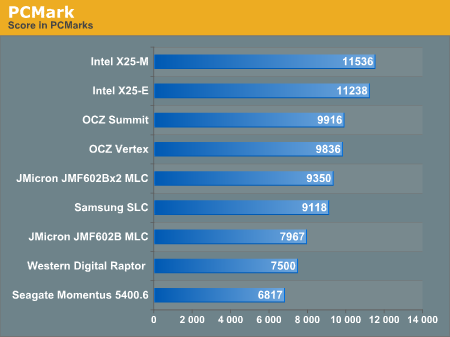
If you've paid attention to the synthetic tests from the previous pages, the results here should make sense. The Intel drives take the top two spots followed by the two OCZ drives, then the JMicron and conventional HDDs take up the rear.
While PCMark does do a great job of measuring disk performance, it doesn't seem to stress random write performance as much, allowing the JMicron drives to relax a bit.
Now let's look at the individual test suites:
The memories suite includes a test involving importing pictures into Windows Photo Gallery and editing them, a fairly benign task that easily falls into the category of being very influenced by disk performance.
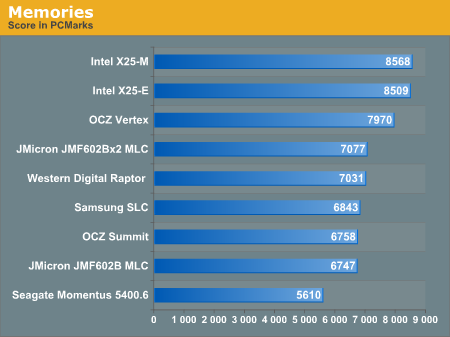
The TV and Movies tests focus on on video transcoding which is mostly CPU bound, but one of the tests involves Windows Media Center which tends to be disk bound.
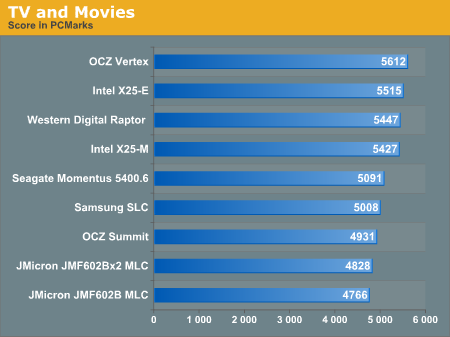
SSDs won't always dominate and in many cases they won't offer tangible improvements over a fast hard drive.
The gaming tests are very well suited to SSDs since they spend a good portion of their time focusing on reading textures and loading level data. All of the SSDs dominate here, but as you'll see later on in my gaming tests the benefits of an SSD really vary depending on the game. Take these results as a best case scenario of what can happen, not the norm.
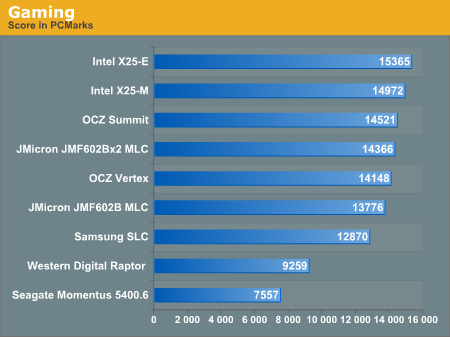
In the Music suite the main test is a multitasking scenario: the test simulates surfing the web in IE7, transcoding an audio file and adding music to Windows Media Player (the most disk intensive portion of the test).
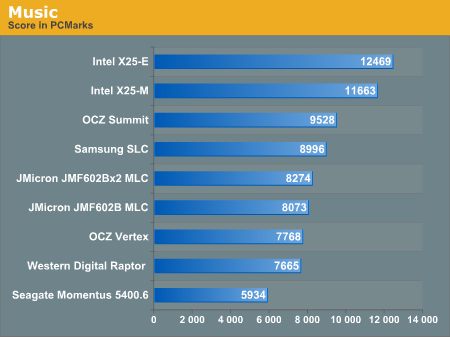
The Communications suite is made up of two tests, both involving light multitasking. The first test simulates data encryption/decryption while running message rules in Windows Mail. The second test simulates web surfing (including opening/closing tabs) in IE7, data decryption and running Windows Defender.

I love PCMark's Productivity test; in this test there are four tasks going on at once, searching through Windows contacts, searching through Windows Mail, browsing multiple webpages in IE7 and loading applications. This is as real world of a scenario as you get and it happens to be representative of one of the most frustrating HDD usage models - trying to do multiple things at once. There's nothing more annoying than trying to launch a simple application while you're doing other things in the background and have the load take seemingly forever.
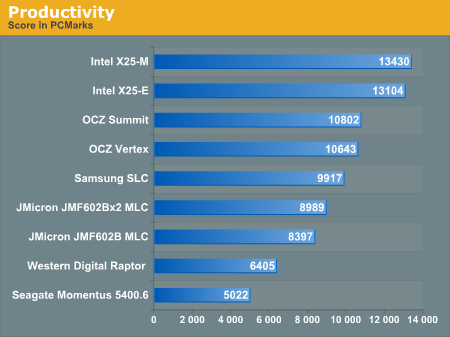
The results here are the best characterization of my personal experience with the drives. The Intel drives are the fastest, a good 25% faster than the Summit or Vertex. Next up are the OCZ drives, with the Vertex dangerously close to the Summit. The older Samsung SLC is next in the standings, followed by the JMicron drives. There's a healthy combination of reads and writes going on here which benefits all of the SSDs, including the less desirable ones.
The final PCMark Vantage suite is HDD specific and this is where you'll see the biggest differences between the drives:
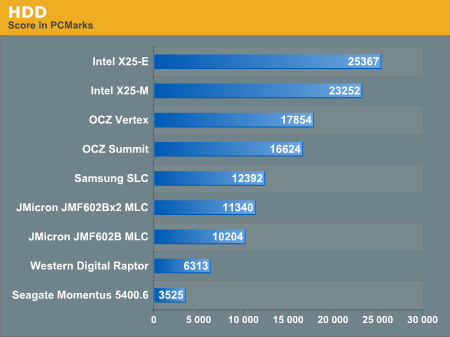
Again we're seeing the sort of breakdown we'd expect. The Intel drives come out ahead, while the Vertex is the best bang for your buck.










250 Comments
View All Comments
ryedizzel - Thursday, March 19, 2009 - link
Anand,I just wanted to thank you for an amazing article. I am a very picky buyer and technology critic, so I always come to your site for the ‘real’ story on things. In fact for the amount of time, research, and (useful) testing methodologies you invest, I almost feel guilty receiving this information for free. Especially since your findings benefit the industry as a whole since it causes manufacturer’s to fix/improve their products (well at least the smart ones do). The i7 motherboard roundup was another great example of this. Seriously, if you have a place for donations I would send you $50 in a heartbeat. I know it’s not much but if others did the same it would add up to a decent token of appreciation.
Oh and please don’t take people’s grammar or nitpicky corrections the wrong way. Yes it can be annoying, but in the end it does help the article become closer to perfect since others catch little things overlooked by human error. In the end we are all grateful for these articles, otherwise we wouldn’t be here reading them!
bsoft16384 - Thursday, March 19, 2009 - link
You know, the JMicron SSDs really aren't so bad. Yes, you'd have to be crazy to spend $400 on one when there are better options like the X25-M (or the new Vertex series for that matter).But I paid $65 for my 30GiB OCZ "Core" SSD. Yeah, random writes are piss slow. I knew this. The drive replaced the 5400.5 that came with my EEE PC.
I'm not going to be doing any 'extensive multitasking' on my EEE. I'm not running a file server, I certainly don't have antivirus in the background, and I don't spend all day installing new apps.
I'm running 7. Compared with the 5400.5, the system boots faster, Chrome loads faster, but Windows updates take longer. That's a trade-off I'm willing to deal with, considering that I get less noise and more battery life in return.
I can tell you this - the JMicron SSDs beat the pants off of the PCIe MLC SSDs that ship with many netbooks.
So, yeah, I guess this is a product that's "unfit for market". But it's perfect for some of us. If I wanted a boot drive for a Linux media/backup server (along with HDDs for storage), I could see choosing a $50 SSD over a $50 HDD.
It's all about your needs. No one is pretending that JMicron SSDs are fast, at least not at writing. But if your usage is mostly read-centric (or "nothing-centric", as is frequently the case on netbooks), and your chief criteria are low power and low price, the JMicron SSDs do quite well.
petersterncan - Thursday, March 19, 2009 - link
Anand,That was an awesome article... and good for you to give OCZ to do the right thing... and they did!
Kudos also to OCZ for actually listening to feedback and doing something about it.
Adul - Thursday, March 19, 2009 - link
Good work Anand :)SSDMaster - Thursday, March 19, 2009 - link
The stuttering problem with SSD's can be fixed with diskpart. Go do some research before you post an article this massive and convoluted.goinginstyle - Thursday, March 19, 2009 - link
No it does not, it will help if the partition is properly aligned but it is not a cure, neither is the rest of the voodoo magic being spouted on the OCZ forums. They help, but do not cure the stuttering problem with the JMicron based drives. I just love the fact that OCZ wants to sell you a drive (Core series) that does not work properly, have you purchase third party software, and then hack the OS in order to improve the performance of the product. Glad to see it fixed with the Vertex and Summit drives though, but it will take a long time before I even think about using an OCZ product again. I was hoping to see the new ADATA and SuperTalent drives in this article, maybe those are coming in the next segment he mentioned.SSDMaster - Friday, March 20, 2009 - link
Yes, it does.I have a Core series 60GB OCZ drive. I bought it right before Newegg increased the price on the drives. The stuttering was horrible, and worthless even as a secondary drive if it was formatted with XP. Also, after using Diskpart and aligning the drive I could not install XP on the drive and have it bootable.. Which sucked.
But there's ways around that, and guess what, I have a stutter free flash drive for cheap that gets very good performance numbers, and boots Server 2008 in under 10 seconds.
bsoft16384 - Thursday, March 19, 2009 - link
OCZ's product works fine. You may not like the performance, but it's certainly not unusable.The $65 I paid for my 30GiB OCZ "Solid" SSD is about what you'd pay for a USB flash drive. The disk I have has a USB interface, which is very convenient, plus it's plenty fast enough for my EEE PC.
I'm glad that Anand has done these reviews. People need to understand what they're getting into when they by a JMicron SSD. If you don't expect much, you won't be disappointed.
Arguably for a normal notebook/desktop you should buy a normal hard drive if your budget is under $100. But the JMicron SSDs do a good job in netbooks (which, again, aren't too fast to begin with) at a very low price.
I have aligned my partitions and disabled swap on my Windows 7 install (on my EEE). I also have 2GB of memory in my EEE. I haven't done any fancy tweaking on the OS.
Compared with the EEE 900A that I had briefly (PCIe SSD), my EEE 900HA is dramatically faster. You can't run XP or Vista on PCIe SSDs unless you have a lot of patience. You *can* run it on a JMicron SSD.
I honestly don't notice any stuttering. I don't run antivirus and I don't multitask much on this machine. If I demanded from my EEE what I demand from my desktop (Q9300 + 8GB + WD6400AAKS), I know that the SSD would choke up. But I'm not going to do that on a 1.6GHz single-core Atom anyway.
So, yeah, OK. I guess I think that trashing JMicron SSDs is a little like trashing USB flash drives for being slow. Paying $300 for a UFD would be stupid, as is paying $300 for a JMicron SSD. But in the sub-$100 category, you don't expect much.
When better SSDs drop below $100, maybe I'll upgrade. Until then, I'm enjoying 5 hours of battery life on my 900HA.
tomoyo - Thursday, March 19, 2009 - link
Well I think it's unusable for my needs if I'm running it as an operating system drive. I place a giant important on the latency of the drive at that point and it certainly includes random writes. Which is why I would never ever buy an ssd that's majorly below the Intel write performance. It's not worth the price premium or loss of storage size compared to the standard hard drive.Bikerskummm - Thursday, March 19, 2009 - link
Fantastic article Anand!Just a few thoughts:
I have had some trouble replicating some of the Samsung SLC results...
Despite filling the drive up and emulating a well used drive as described in the article I cannot get my Sammy drive's performance to degrade as much as you managed to especially regarding random write performance...
Now my system used for testing is a socket 775 (qx9650) and I was testing on ICH9R and WINXP (SP3) but still I would expect to see similar figures ...
I do not have an X58 system to test on at the moment but I would be very interested if The Sammy SLC drives were shown to degrade faster / perform worse with a X58 / ICH10R / Vista x64 (SP1?) setup...